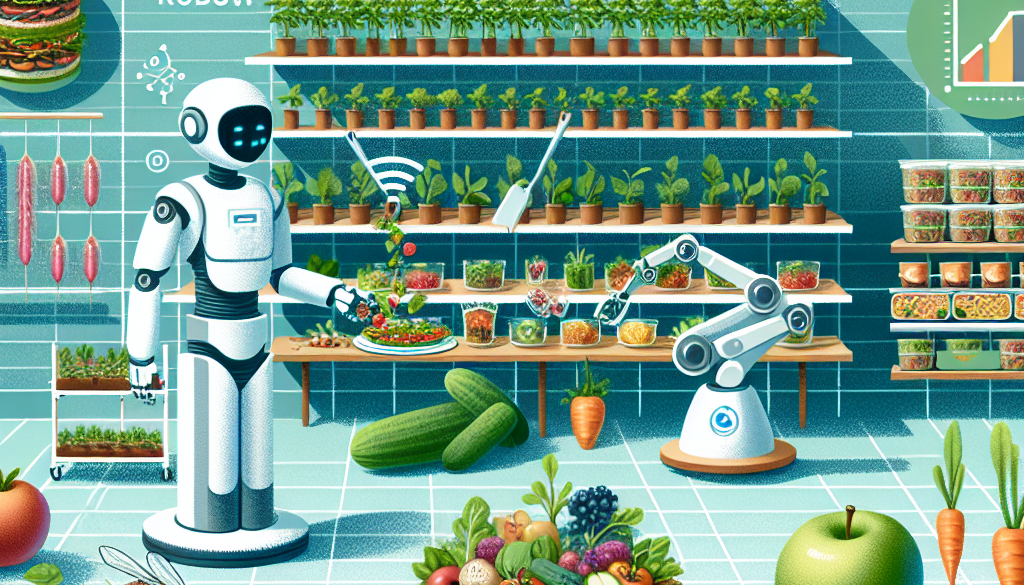Pivotal Trends Affecting the Future of the Food Industry.
-
Table of Contents
- Future Food Industry Trends: Shaping Tomorrow’s Nutrition
- 1. Sustainability and Ethical Sourcing
- 2. Technological Innovations in Food Production
- 3. The Rise of Alternative Proteins
- 4. Personalized Nutrition and Functional Foods
- 5. E-Commerce and Direct-to-Consumer Models
- Conclusion
- ETprotein: Leading the Way in Alternative Protein Solutions
Future Food Industry Trends: Shaping Tomorrow’s Nutrition
The food industry is a dynamic and ever-evolving sector, influenced by a myriad of factors including technological advancements, consumer preferences, and global economic conditions. As we look towards the future, several pivotal trends are emerging that are set to reshape the way we produce, distribute, and consume food. Understanding these trends is crucial for businesses, policymakers, and consumers alike, as they navigate the challenges and opportunities ahead.
1. Sustainability and Ethical Sourcing
With the growing awareness of environmental issues, sustainability has become a key concern in the food industry. Consumers are increasingly demanding transparency in the sourcing of ingredients and are showing a preference for products that are environmentally friendly and ethically sourced. According to a Nielsen report, 73% of global consumers say they would definitely or probably change their consumption habits to reduce their impact on the environment.
- Regenerative agriculture practices
- Reduction of food waste through innovative technologies
- Increased use of plant-based and lab-grown alternatives to reduce carbon footprint
2. Technological Innovations in Food Production
Technology is revolutionizing the food industry, from farm to table. Innovations such as precision agriculture, artificial intelligence, and blockchain are improving the efficiency and traceability of food production. For instance, the use of drones and sensors can help farmers monitor crop health and optimize resource use, potentially increasing yields while minimizing environmental impact.
- Automation and robotics in food processing and packaging
- Advancements in genetic engineering for crop improvement
- Blockchain for enhanced food safety and traceability
3. The Rise of Alternative Proteins
Alternative proteins are gaining traction as consumers seek out more sustainable and ethical sources of nutrition. Plant-based proteins, in particular, are experiencing a surge in popularity, with the market expected to grow to $85 billion by 2030, according to UBS. Additionally, cultured meat, produced in labs from animal cells, presents a novel solution that could significantly reduce the environmental impact of meat production.
- Expansion of plant-based meat and dairy alternatives
- Investment in cultured meat research and development
- Integration of alternative proteins into mainstream food products
4. Personalized Nutrition and Functional Foods
As the understanding of the relationship between diet and health deepens, personalized nutrition is becoming more prevalent. Consumers are seeking out functional foods that cater to their individual health needs and dietary restrictions. The global functional foods market is projected to reach $275.77 billion by 2025, according to Grand View Research.
- Advances in nutrigenomics and personalized diet plans
- Growth in demand for foods with added health benefits
- Development of smart packaging that can track and communicate nutritional content
5. E-Commerce and Direct-to-Consumer Models
The rise of e-commerce has transformed the way consumers shop for food. Online grocery sales are expected to capture 20% of the market by 2025, as reported by the Food Marketing Institute and Nielsen. Direct-to-consumer (DTC) models are also gaining popularity, allowing food producers to build closer relationships with their customers and gather valuable data on consumer preferences.
- Growth of online grocery shopping and meal kit delivery services
- Emergence of DTC brands in the food and beverage sector
- Use of data analytics to tailor offerings and improve customer experience
Conclusion
The future of the food industry is being shaped by a confluence of trends that prioritize sustainability, technological innovation, alternative proteins, personalized nutrition, and e-commerce. These trends are not only transforming the industry but also offering new opportunities for businesses to innovate and for consumers to enjoy a wider range of healthier, more sustainable food options. As the industry continues to evolve, staying ahead of these trends will be crucial for success.
ETprotein: Leading the Way in Alternative Protein Solutions
In line with the trend towards alternative proteins, ETprotein offers a range of high-quality, organic bulk vegan proteins that cater to the growing demand for sustainable and ethical nutrition. Their products, including rice protein, pea protein, and various seed proteins, are non-GMO, allergen-free, and feature a neutral taste, making them ideal for a variety of applications in the food and beverage industry.
ETprotein’s commitment to quality and sustainability positions them as a valuable partner for businesses looking to innovate in the alternative protein space. Their expertise in exporting and delivering tailor-made protein solutions ensures that they can meet the diverse needs of their global clientele.
About ETprotein:
ETprotein, a reputable protein and L-(+)-Ergothioneine (EGT) Chinese factory manufacturer and supplier, is renowned for producing, stocking, exporting, and delivering the highest quality organic bulk vegan proteins and L-(+)-Ergothioneine. They include Organic rice protein, clear rice protein, pea protein, clear pea protein, watermelon seed protein, pumpkin seed protein, sunflower seed protein, mung bean protein, peanut protein, and L-(+)-Ergothioneine EGT Pharmaceutical grade, L-(+)-Ergothioneine EGT food grade, L-(+)-Ergothioneine EGT cosmetic grade, L-(+)-Ergothioneine EGT reference grade and L-(+)-Ergothioneine EGT standard. Their offerings, characterized by a neutral taste, non-GMO, allergen-free attributes, with L-(+)-Ergothioneine purity over 98%, 99%, cater to a diverse range of industries. They serve nutraceutical, pharmaceutical, cosmeceutical, veterinary, as well as food and beverage finished product distributors, traders, and manufacturers across Europe, USA, Canada, Australia, Thailand, Japan, Korea, Brazil, and Chile, among others.
ETprotein specialization includes exporting and delivering tailor-made protein powder and finished nutritional supplements. Their extensive product range covers sectors like Food and Beverage, Sports Nutrition, Weight Management, Dietary Supplements, Health and Wellness Products, and Infant Formula, ensuring comprehensive solutions to meet all your protein needs.
As a trusted company by leading global food and beverage brands and Fortune 500 companies, ETprotein reinforces China’s reputation in the global arena. For more information or to sample their products, please contact them and email sales(at)ETprotein.com today.












